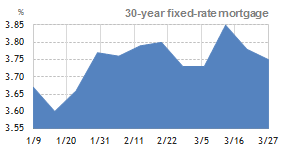Debt Debate puts Brake on Mortgage Rates
Thursday, January 17, 2013 -
Article by:
Carlo Sanchez - Security National Mortgage Company -
![]()
Debt debate puts brakes on mortgage rates
Mortgage rates dropped this week as Congress and President Barack Obama continue to wrangle over raising the country's debt limit.

The benchmark 30-year fixed-rate mortgage fell to 3.6 percent from 3.67 percent, according to the Bankrate.com national survey of large lenders. The mortgages in this week's survey had an average total of 0.36 discount and origination points. One year ago, the mortgage index stood at 4.18 percent; four weeks ago, it was 3.62 percent.
The benchmark 15-year fixed-rate mortgage fell to 2.89 percent from 2.92 percent. The benchmark 5/1 adjustable-rate mortgage fell to 2.74 percent from 2.77 percent.
Weekly national mortgage survey
Results of Bankrate.com's Jan. 16, 2013, weekly national survey of large lenders and the effect on monthly payments for a $165,000 loan:
| 30-year fixed | 15-year fixed | 5-year ARM | |
|---|---|---|---|
| This week's rate: | 3.6% | 2.89% | 2.74% |
| Change from last week: | -0.07 | -0.03 | -0.03 |
| Monthly payment: | $750.16 | $1,130.75 | $672.72 |
| Change from last week: | -$6.51 | -$2.37 | -$2.63 |
Some analysts say mortgage rates will spike if Congress fails to raise the federal government's borrowing limit and allows the country to go into default. But so far, the debt ceiling debate seems to have helped consumers by pushing rates lower, rather than hurting them with higher rates.
"The market expectation is that there will be a fight until the last minute over the debt ceiling but it will eventually be resolved," says Stewart Larsen, executive vice president for the mortgage banking division at Bank of the West in Omaha, Neb.
Larsen says he expects rates to remain somewhat stable while investors take a wait-and-see approach. What happens next will depend on how Washington, D.C., handles the U.S. debt woes and how investors react to it.
On Tuesday, credit rating agency Fitch Ratings said that it will review the country's AAA rating if Congress fails to raise the debt ceiling "in a timely manner."
If the unlikely event becomes reality, markets worldwide could be affected. But it's possible that investors will still view U.S. Treasuries and mortgage bonds as a safe haven even much like they did during the 2011 debt ceiling debacle. At that time, Treasury yields went down, and mortgage rates fell with them, on investors' concerns that the government could default on its debt.
Regardless of how the debt ceiling issue is resolved, the effect on mortgage rates will be short-lived, says Paul Anastos, president of Mortgage Master in Walpole, Mass.
"Things like resolving the 'fiscal cliff' or the debt ceiling make people feel better for about 24 hours," he says. "Long term, what matters is jobs and consumer confidence."
Consumer confidence could be hurt
Regardless of the outcome over the debt ceiling issue, the psychological effect on consumers of so much uncertainty about the country's fiscal situation and the economy could be a threat to the housing recovery, some mortgage professionals say.
Larsen says he has noticed an uptick in the number of potential homebuyers seeking to get preapproved for a mortgage since the beginning of the year. The volume of mortgage applications from buyers increased 13 percent last week compared to the previous week, according to the Mortgage Bankers Association. And homebuilders remain bullish on the steady recovery.
"Low mortgage rates, affordable home prices, reduced foreclosures and an extremely favorable 'rent versus own' comparison continue to drive the recovery," says Stuart Miller, chief executive officer of Lennar Corp., a homebuilder.
But will that confidence among buyers and builders continue amid the uncertainty? That remains to be seen, says Anastos. Another concern is how smaller paychecks, resulting from the expiration of the payroll tax reduction, will affect potential buyers, he says.
"You have to think about how all of these things affect consumers," he says.
With so much uncertainty ahead, mortgage professionals offer one bit of advice: If you qualify to refinance your mortgage or are ready to purchase now, don't wait for lower rates.
"When you are in the low 3's on a 30-year fixed-rate mortgage, there's not much room to go lower," Anastos says.
Didn't find the answer you wanted? Ask one of your own.
Ask our community a question.
Related Articles
Featured Lenders



